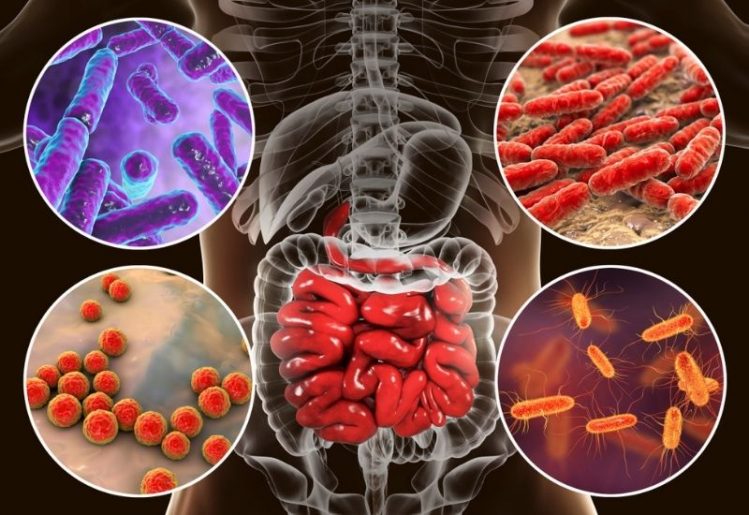The gut microbiome is made up of trillions of different types of bacteria, fungi, viruses and other species, most of which reside inside the cecum, a pocket within the large intestine. Although the individual species are microscopic, as a whole, they can weigh up to five pounds. The gut microbiome is so important to human health that it is often considered to be its own separate organ. The gut microbiome works to protect your overall health in many different ways. Recently, new research has discovered more about how genetics shape gut microbiome function, providing additional insight into the importance of maintaining a healthy balance of gut microbes.
Why is the Microbiome Function Important?
 The gut microbiome is responsible for a host of functions necessary for good health and optimal wellness. Obsiouvsly, perhaps, the gut microbiome is responsible for good digestive system health, playing a vital role in intestinal diseases such as irritable bowel syndrome (IBS) and inflammatory bowel disease (IBD). A properly functioning gut microbiome works to maintain good gut health and mitigate the chance that disease-causing bacteria sets in and takes hold.
The gut microbiome is responsible for a host of functions necessary for good health and optimal wellness. Obsiouvsly, perhaps, the gut microbiome is responsible for good digestive system health, playing a vital role in intestinal diseases such as irritable bowel syndrome (IBS) and inflammatory bowel disease (IBD). A properly functioning gut microbiome works to maintain good gut health and mitigate the chance that disease-causing bacteria sets in and takes hold.
Additionally, the wrong balance of healthy and unhealthy microbes has also been demonstrated to increase the risk of weight gain. Conversely, probiotics that support healthy microbes in the gut can help you to control your weight.
While it may not seem related, a healthy gut microbiome can also help to prevent blocked arteries that lead to heart disease. A robust microbiome may also support healthy blood sugar levels, helping to prevent the onset of diabetes.
Lastly, the gut microbiome organ can affect brain health, as it delivers chemicals and communicates with the nerves that run to the brain. Numerous recent studies have demonstrated a connection between the health of the gut microbiome and the risk of developing mental health conditions such as depression and anxiety. This bidirectional communication between the gut and the central nervous system is aptly known as the gut-brain axis.
How Do Genetics Shape Gut Microbiome?
It has only been more recently that scientists have been able to truly dive deeply into the composition of the gut microbiome and learn more about how both environmental factors and genetics influence this organ. A recent study out of the MiBioGen consortium explored how various genetic factors can determine the composition and function of the gut microbiome, ultimately finding that at least two genes were integral in shaping the composition of the gut microbiome.
Other studies have shown that a person’s blood type could influence their gut microbiome. For example, scientists discovered that individuals with blood groups A, AB, or B had more bacteria of the Bacteroides group present in the intestine rather than only on the surface of the red blood cells.
Data such as this is important because it could explain why some people are more susceptible to illnesses such as norovirus infections. This revelation also helps to show how human genetics can be a powerful predictor of the overall function of the gut microbiome. If people were to better understand the genetic makeup of their individual microbiome, it would be easier to make smart choices to support this function.
How Can You Maintain a Healthy Gut Microbiome?
Your gut microbiome is a fluid organ, meaning that this biological system can be influenced through a myriad of lifestyle choices not related to genetics. While some aspects of the gut microbiome are indeed hereditary, other elements can be determined through the choices that you make for your health. Here are a few things that you can do to maintain a healthy gut microbiome.
Eat Fermented Foods
One of the best things that you can do to support gut health is to be intentional about eating fermented foods. Good choices include sourdough bread, kimchi, kombucha, miso, tempeh and sauerkraut. Yogurt is also a great choice because of its gut-restoring probiotics.
Supplements
A supplement focused on maintaining a normal gut through the use of probiotics and prebiotics will go a long way in giving your body that extra insurance that you need.
Embrace Mother Nature
Getting outside in nature provides the opportunity for the gut microbiome to take in a diverse range of microorganisms. This diversity in the natural world can help to strengthen the human gut microbiome.
Stay Well-Hydrated
 Proper hydration is key to a number of body functions, and your gut microbiome is no different. Drinking enough water helps everything move through the lower digestive tract more efficiently while also supporting the lining of the intestines so that the right bacteria can grow and flourish.
Proper hydration is key to a number of body functions, and your gut microbiome is no different. Drinking enough water helps everything move through the lower digestive tract more efficiently while also supporting the lining of the intestines so that the right bacteria can grow and flourish.
Lower Stress Levels
While this is often easier said than done, it is also a good idea to be purposeful about reducing unnecessary stress in your life. Persistent stress has been shown to increase the risk of inflammation in the digestive tract while also making your body more susceptible to infections in this part of the body.
It is becoming more clear that the function of the gut microbiome is influenced by both genetic and external environmental factors. As more data is revealed, health-conscious individuals are provided more tools on how they can boost gut microbiome function.

